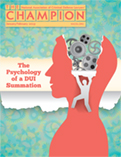January/February 2019

What are some things defense counsel can do to deliver a solid and convincing summation in a DUI trial?
Articles in this Issue
-
A Handful of ACEs: Another Approach Under § 3553(a)
Lawyers encounter a substantial number of people who have suffered from a high number of Adverse Childhood Experiences (ACEs) that resulted in maladaptive risk behaviors and influenced the commission of the client’s offense conduct. Since lawyers are unrestricted in the information they can present to the court during sentencing under 18 U.S.C. § 3553(a) and 18 U.S.C. § 3661, David Savitz urges advocates to become familiar with the ACEs Study. When using an ACEs approach, the attorney is not offering an excuse for the defendant’s conduct, but rather an explanation of it.
-
Affiliate News
What events are NACDL affiliates hosting this month? Find out here.
-
Book Review: 51 Imperfect Solutions by Jeffrey S. Sutton
This month Ivan J. Dominguez reviews 51 Imperfect Solutions by Jeffrey S. Sutton.
-
Book Review: Butterfly in the Rain by James L. Neibaur
This month Matthew T. Mangino reviews Butterfly in the Rain by James L. Neibaur.
-
Book Review: Invisible by Stephen L. Carter
This month Gabriel Reyes reviews Invisible by Stephen L. Carter.
-
Book Review: The Sun Does Shine by Anthony Hinton
This month Michael H. Fox reviews The Sun Does Shine by Anthony Ray Hinton.
-
Bright Spots in Public Defense: The Colorado Office of the Alternate Defense Counsel
This article describes the history, function and evolution of Colorado’s statewide conflict counsel agency, the Colorado Office of the Alternate Defense Counsel.
-
Cross Country: Unpacking the Many Deceptions Inside a Single Lie
Initially, the witness gives a false story: “I was eating pizza with my cousin.” But now the witness says the truth is that he was with defense counsel’s client — robbing a store. Lawyers sometimes mistakenly believe that the payoff is the admission of the untruthful statement. The big payoff, Larry Pozner explains, is something deeper.
-
From the President: Location, Location, Location: Just as in Real Estate, for Cooperating Defendants
Do criminal practitioners truly understand what substantial assistance means? Does a motion made by the government under U.S.S.G. § 5k1.1 mean the same thing in Georgia as it means in Texas? What about between districts in the same state? A thorough analysis of the publicly available data maintained by the Sentencing Commission begins to tell a tale of vast differences in the way cooperation is treated nationwide.
-
Inside NACDL: Rooting Out Bias: How a Bad Stop Can Make Good Law
A dubious traffic stop of a young man in Vermont provided a unique opportunity for NACDL to further its mission to redress systemic racism in the criminal justice system. In February 2018, NACDL submitted an amicus brief in the Vermont Supreme Court urging the court to find an implied right of action under Article 11 of the Vermont Constitution to permit an action against the State for damages and declaratory relief to challenge an unlawful stop based on racial bias.
-
NACDL News: Chinese Prosecutors Visit NACDL
NACDL News January-February 2019
-
NACDL News: Former NACDL Board Member Candace Crouse Elected Appellate Judge in Ohio
NACDL News January-February 2019
-
NACDL News: NACDL Board Member Robert Toale Receives Justice Albert Tate Jr. Award
NACDL News January-February 2019
-
NACDL News: NACDL Co-Sponsors First-of-Its-Kind Rural Criminal Justice Summit
NACDL News January-February 2019
-
NACDL News: NACDL Discusses Criminal Justice Issues in Savannah
NACDL News January-February 2019
-
NACDL News: NACDL Files Suit Demanding Records About Government's Monitoring of Emails Between I
NACDL News January-February 2019
-
NACDL News: The NACDL Foundation for Criminal Justice Announces New Officers and Historic Vision for
NACDL News January-February 2019
-
The Psychology of a DUI Summation
What are some things defense counsel can do to deliver a solid and convincing summation in a DUI trial? Edward Fiandach recommends the use of “Devil Words” (such as contaminated) that have the power to curse the prosecution’s case. To accomplish their aim, Devil Words must not only raise a negative aspect of the prosecution’s case during trial, but they also must be used in summation to recall that negative aspect. Fiandach provides a list of Devil Words and their possible uses to employ in summation to help jurors remember important questions, lines, and demonstrations.
-
Venue in Federal Criminal Cases: A Strange Duck
From the defense perspective, it is preferable to be prosecuted in the defendant’s district of residence. David Spears discusses (1) how to identify improper venue, (2) the time when counsel must raise a venue defense, (3) getting a venue defense before a jury, and (4) the venue right and double jeopardy. A good venue argument can be an important strategic tool before and after indictment, and a venue defense can upend nearly completed trial proceedings or overturn a conviction on appeal.
